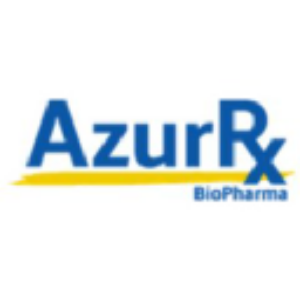AzurRx BioPharma Provides Insight into Drawbacks of Using Porcine Products in Production of Pharmaceuticals and Medicinals, Offers Update on Efforts to Produce Synthetic Alternatives
Rhea-AI Summary
AzurRx BioPharma (NASDAQ: AZRX) is advancing efforts to develop synthetic alternatives to porcine-derived pharmaceuticals, specifically targeting exocrine pancreatic insufficiency (EPI) linked to cystic fibrosis. The company's lead candidate, MS1819, is undergoing two Phase 2 clinical trials, showing promising results in enhancing fat absorption without adverse effects. Notably, supply chain issues from pork ingredient variability and disease risks highlight the need for such alternatives. The firm has activated two trial sites in Turkey, with a full data readout expected in Q2 2021.
Positive
- Promising results from MS1819 trials, showing improvement in fat absorption.
- Activation of two new trial sites in Turkey enhances clinical trial recruitment.
Negative
- Supply chain issues due to reliance on porcine products.
- Concerns over variability and impurities in enzyme concentrations from pork.
Insights
Analyzing...
NEW YORK, Oct. 29, 2020 (GLOBE NEWSWIRE) -- via InvestorWire -- AzurRx BioPharma, Inc. (NASDAQ: AZRX) (“AzurRx” or the “Company”), a New York-based biopharmaceutical company specializing in the development of therapeutic proteins for the treatment of patients with gastrointestinal disorders, today provides insight on the usage of porcine products in producing pharmaceuticals and medicinals and the inherent downsides associated with this usage, as well as updates regarding its own efforts to develop synthetic alternatives to porcine ingredients.
Pigs have been used in medical research for centuries. They are used as general surgical models, in dermatological studies involving wound healing and plastic surgery procedures, in toxicology and pharmacology studies, and in transplantation studies, among other areas of research. They are also used in nearly 20 medications and pharmaceuticals, according to information from the U.S. pork industry, including six for the pancreas. However, there are supply chain, concentration and purity issues arising from using porcine ingredients to treat problems related to pancreas malfunction.
Due to these issues, AzurRx is among several companies working to develop synthetic products to replace porcine ingredients wherever possible. One promising therapy AzurRx has developed is its lead product candidate, MS1819, a recombinant lipase that is being studied for the treatment of exocrine pancreatic insufficiency (EPI) associated with cystic fibrosis (CF) and chronic pancreatitis (CP). AzurRx is pursuing parallel clinical pathways – a Phase 2b monotherapy clinical trial and a Phase 2 combination therapy trial.
Pancreas medications help replace enzymes that the pancreas can no longer produce due to cystic fibrosis, pancreatitis, pancreatic cancer and other causes. Currently, patients are required to take as many as 60 tablets per day depending on their symptoms.
In 2019, according to the Organization for Economic Co-operation and Development, the top 20 hog producers in the world produced 88,756.90 metric tons of hogs. Of that total production, China accounted for 54,757.00 metric tons, or 61.7 percent. The next-closest producer was the U.S. with 12,036.50 metric tons. It is obvious from the data that China is by far the greatest supplier of porcine products for pharmaceutical and medicinal therapies.
As China’s dominance in this area has grown, there have been several issues raised regarding supply line availability, product impurities and enzyme variability. Swine flu and other diseases have severely cut production, causing supply chain issues. The Chinese Ministry of Agriculture and Rural Affairs reported China’s hog herd had declined in October 2019 by 41 percent from a year earlier.
Additionally, according to The New York Times, there have also been reports of wide variations in the enzyme concentrations in pills derived from pork, which are sold by several companies. Dr. Leslie Hendeles, a Florida professor, said it was not clear how much of the disparity was attributable to variations in pig pancreases and/or an industry technique called overfill, in which extra ingredients are added so capsules do not lose potency before their expiration dates.
According to the same The New York Times article, a history of unusual variations and impurities in pig-derived pills has led the Cystic Fibrosis Foundation to pursue an alternative. History has shown that the risk of transmitting disease from animal-based drugs, while small, is not merely theoretical, according to Paul W. Brown, a retired National Institutes of Health senior investigator -
“Any time you take a tissue or an extract process from a tissue from one species and put it into another species or even another animal, you run the risk of unwanted pathogens that you didn’t know were there; that’s been responsible for repeated problems over the course of time,” Dr. Brown said. “If you can do something without taking tissue or a product from another being, you’re ahead of the game.”
In August, AzurRx announced positive results from the first five patients in its Phase 2 combination therapy trial of MS1819 for the treatment of severe exocrine pancreatic insufficiency (EPI) in patients with cystic fibrosis (CF). In the primary efficacy analysis, patients receiving MS1819 in combination with PERT therapy achieved a clinically meaningful improvement in the coefficient of fat absorption (CFA) at each of the three dose levels, with no adverse safety events reported. Additionally, patients showed improvements in the key secondary endpoints, including body weight, stool consistency, and reductions in the number of bowel movements and the incidence of steatorrhea.
In October, the Company announced that it has activated two trial sites in Turkey for its Phase 2 Combination Therapy clinical trial to investigate MS1819 in cystic fibrosis (CF) patients with severe exocrine pancreatic insufficiency (EPI). A total of eight of the expected 12 sites in Europe are now active and recruiting patients.
“We are truly pleased and encouraged by the interest in our expanding global Phase 2 Combination Trial,” said Dr. James Pennington, chief medical officer of AzurRx. “The recently reported interim data suggests promising results, and the full data readout is expected in the second quarter of next year. Our investigators in Turkey have been extremely diligent in driving the startup of this trial in a very efficient and effective manner, and we look forward to our continued work with them.”
About AzurRx BioPharma, Inc.
AzurRx BioPharma, Inc. (NASDAQ: AZRX) is a biopharmaceutical company specializing in the research and development of non-systemic biologics for gastrointestinal disorders. The Company is focused on the development of its lead drug candidate, MS1819. AzurRx is currently conducting two Phase 2 clinical trials of MS1819: the OPTION 2 monotherapy trial and the Combination therapy trial, consisting of MS1819 in conjunction with porcine-derived pancreatic enzyme replacement therapy, the current standard of care. The Company is headquartered in New York, New York, with clinical operations in Hayward, California.
Additional information on the Company can be found at www.azurrx.com
Request Additional Information & Ongoing Updates
Forward-Looking Statements
This press release may contain certain statements relating to future results which are forward-looking statements. These statements are not historical facts but, instead, represent only the Company’s belief regarding future events, many of which, by their nature, are inherently uncertain and outside of the Company’s control. It is possible that the Company’s actual results and financial condition may differ, possibly materially, from the anticipated results and financial condition indicated in these forward-looking statements. Additional information concerning the Company and its business, including a discussion of factors that could materially affect the Company’s financial results, including those related to the clinical development of MS1819, the results of its clinical trials, and the impact of the coronavirus (COVID-19) pandemic on the Company’s operations and current and planned clinical trials, including, but not limited to delays in clinical trial recruitment and participation, are contained in the Company’s Annual Report on Form 10-K for the year ended Dec, 31, 2019, under the heading “Risk Factors,” as well as the Company’s subsequent filings with the Securities and Exchange Commission. All forward-looking statements included in this press release are made only as of the date of this press release, and we do not undertake any obligation to publicly update or correct any forward-looking statements to reflect events or circumstances that subsequently occur or of which we hereafter become aware.
Corporate Communications:
InvestorBrandNetwork (IBN)
Los Angeles, California
www.InvestorBrandNetwork.com
310.299.1717 Office
Editor@InvestorBrandNetwork.com
Investor Relations:
LifeSci Advisors, LLC.
Hans Vitzthum
hans@lifesciadvisors.com
Boston, Massachusetts
617.430.7578 Office








